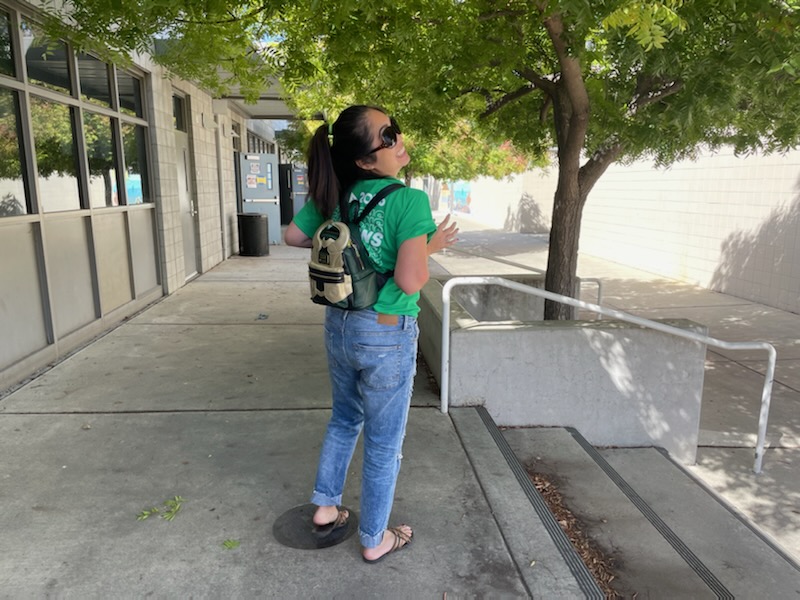Ask science teacher Kristen Thomson which movie she likes the best, and you’ll get a definitive response: “Loki.”
“Loki is just the love of my life. He’s good and bad, but you can’t decide which and it’s just so much fun to watch,” Thomson said. “But if you want a long binge watching session, ‘The Big Bang Theory’ is also phenomenal. I think it was better than ‘Friends,’ and from my generation, that’s saying a lot.”
From “Marvel” to “Reservation Dogs” to “Downton Abbey,” teachers can become as hooked as students on their favorite shows. For Thomson, what makes certain shows so interesting are the nostalgia they bring and the glimpses of real life they reflect.
“I seriously would have discussions like [the ones in ‘Big Bang Theory’] with friends in college,” Thomson said. “I can see my friends in those characters and it cracks me up.”
Thomson also finds the Big Bang Theory to be both lighthearted and silly — “perfect,” she said, for a quick episode before bed.
“When I’m in a bad mood or I just need to get to sleep soon, it’s a nice little break away from my world into [another fun world],” Thomson said.
Science Cheryl Lenz looks for such escapism when picking a TV show too. She said that “Downton Abbey” — with its intricate costumes and sets — transports her into a different time period that looks at the relationships between people in the upper and lower classes, exploring themes she finds particularly meaningful.
“You see that certain issues, such as relationships or money or conflict, are timeless and that people are dealing with the same kind of things that happen today,” she said.
English teacher Amy Keys looks for shows that challenge her expectations.
Keys’ current favorites include “Reservation Dogs” and “Our Flag Means Death.” The former’s title is an allusion to “Reservoir Dogs” — an intense, violent Tarantino movie with a dark comedy aspect. However, “Reservation Dogs” mainly focuses on a group of indigenous children who grow up on a reservation in Oklahoma.
“What I love about it is the writing is really, really clever,” she said. “And unlike a lot of shows, there’s no tokenism. It’s this community of people and they have their lives and they’re Native American, but that’s not the only point of the story; they’re actually living their lives: having friendships, figuring out what to do after they graduate high school, trying to decide how to be individuals separating from their families while remaining a part of their families.”
The show — created by Sterlin Harjo, an American filmmaker who focuses on increasing Native American representation in media, and Taika Waititi, the son of a Maori father and an award-winning filmmaker — features an all indigenous cast and crew.
“It’s really real; it doesn’t pander to a non-native or a white audience, and it’s very funny [when] identifying and lampooning some of the tropes of Native Americans that you might see,” Keys said. “It’s also extremely moving and it has relationships between girls and boys, relationships between men and their families and women with their friends, what it’s like to be a kid and what it’s like to be a parent. I learned a lot from it.”
Key’s other favorite, “Our Flag Means Death,” traces the journey of a man from New Zealand as he decides to become a pirate. However, he later realizes that transitioning to the crude and harsh pirate life isn’t as merry as he thought it to be, and fails to let go of the fine things in life back on shore. In addition, he also struggles to assert command as a captain and lead his band of pirates.
“It’s really funny, like ‘Pirates of the Caribbean’ except way smarter and funnier,” Keys said. “It’s interesting because he’s a minority so he’s also a native person having grown up in a colonized European society.”
Keys said she thinks there are many affinities between Native Americans and Native New Zealanders.
“I like that challenge of your expectations because the guy becomes a pirate because he has this absurd idea, like a fairytale fantasy idea, from his childhood of what a pirate is,” Keys said. “What’s good writing is that everybody can see bits of themselves in [the show]. There are relationships where characters evolve and then you see other facets of all of these characters and they change in relationship with each other.”


























